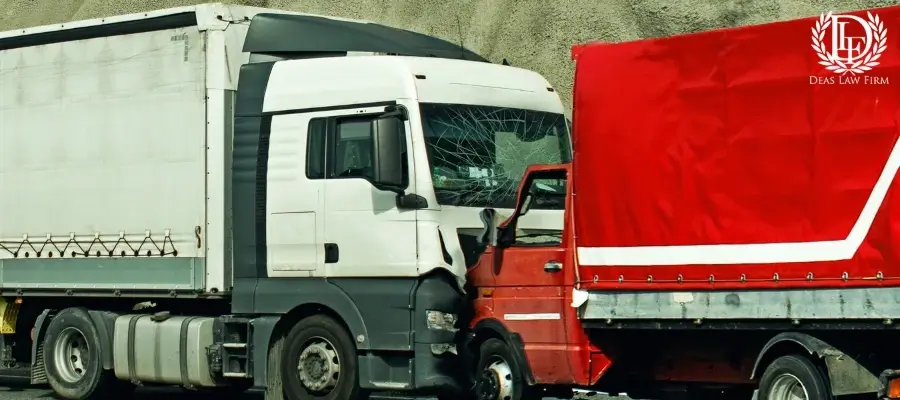|
|
Last Modified on Dec 06, 2024
Jackknife truck accidents are among the most dangerous types of collisions on South Carolina roads. These accidents occur when a truck’s trailer swings out to form an acute angle with the cab, resembling the shape of a folding pocket knife. Understanding the common causes and injuries of jackknife truck accidents in South Carolina can help you identify and potentially avoid this type of collision.
Due to the size and weight of commercial trucks, jackknife accidents often result in catastrophic injuries and significant property damage.
What Causes Jackknife Accidents?
Jackknife truck accidents are typically the result of a combination of factors, including driver error, mechanical failure, and adverse road conditions. One of the most common causes is braking too abruptly. When a truck driver slams on the brakes, the trailer can lose traction and swing out of control, particularly on slippery or uneven surfaces.
Speeding or reckless driving also plays a significant role in jackknife accidents. Trucks require a longer stopping distance than passenger vehicles, and excessive speed increases the likelihood of losing control during a sudden stop.
Other Causes
Driver fatigue is another critical factor due to the long hours behind a wheel that truck drivers undergo as part of their job. Fatigue can greatly reduce the driver’s reaction time and decision-making abilities. Tired drivers may overcompensate or brake too late, which can trigger a jackknife scenario.
Mechanical issues, such as faulty brakes or underinflated tires, contribute to many jackknife accidents. Regular maintenance is crucial for ensuring that a truck’s braking system and tires are in optimal condition. Additionally, improperly loaded cargo can shift during transit, throwing the truck off balance and increasing the risk of jackknifing, especially during sharp turns or sudden stops.
Lastly, poor weather conditions, such as rain, ice, or snow, can reduce traction and make it harder for drivers to control their vehicles. If any of the factors above are combined, it can greatly heighten the likelihood of a jackknife incident.
Common Injuries in Jackknife Accidents
Jackknife truck accidents often lead to devastating injuries due to the sheer force and size of the vehicles involved. Traumatic brain injuries (TBIs) are frequent, occurring when victims’ heads strike hard surfaces or when their brains are jolted by the impact. These injuries can have long-term effects, including cognitive and physical impairments.
Spinal cord injuries are another serious potential consequence of truck accidents. These injuries can lead to partial or complete paralysis. They can also require extensive medical treatment and ongoing rehabilitation. Victims may also sustain broken bones, including fractures to the ribs, arms, and legs, which may result in permanent physical limitations.
Internal injuries, such as damage to organs or internal bleeding, are common in high-impact collisions. These injuries often require emergency medical attention and can be life-threatening if not addressed promptly. Soft tissue injuries, such as whiplash and torn ligaments, are also prevalent and can cause chronic pain or restricted mobility.
Psychological Distress
In addition to physical harm, many victims experience emotional distress and post-traumatic stress disorder (PTSD) following a jackknife accident. The psychological toll of these incidents can significantly impact a victim’s quality of life, making comprehensive treatment critical for recovery.
FAQs
Q: What Is the Most Common Injury for Truck Drivers?
A: One of the most common injuries for truck drivers include musculoskeletal injuries, such as back pain and joint strain, caused by prolonged sitting and heavy lifting. Truck drivers also frequently experience injuries from accidents, including whiplash, fractures, and head trauma. These injuries can have long-term effects, impacting a driver’s ability to work. Seeking medical attention and legal advice after an injury can help ensure proper care and recovery options.
Q: What Causes a Jackknife Accident?
A: A jackknife accident occurs when the trailer swings out of alignment with the truck, forming a sharp angle resembling a folding pocket knife. This can happen due to sudden braking, slippery road conditions, or improper weight distribution in the trailer. Jackknife accidents are very dangerous and often result in significant damage. Proper maintenance and careful driving can help reduce the risk of these incidents.
Q: What Is the Most Common Factor for Skidding and Jackknifing?
A: One of the most common factors for skidding and jackknifing is poor traction, often caused by wet, icy, or otherwise slippery road conditions. Sudden braking or oversteering on these surfaces can cause the wheels to lose grip, leading to skidding and, potentially, a jackknife situation. Regular vehicle maintenance and cautious driving in adverse weather conditions can help minimize these risks.
Q: What Are the Most Common Causes of a Trailer Jackknife?
A: The most common causes of a trailer jackknife include sudden braking, uneven weight distribution, speeding on curves, and slippery road surfaces. These factors can cause the trailer to lose stability and swing out of control. Mechanical issues, such as faulty brakes or underinflated tires, can also contribute. Preventing jackknife accidents requires proper vehicle maintenance, safe loading practices, and adherence to speed limits.
Q: How Do You Prove Fault Following a Jackknife Accident?
A: Proving fault following a jackknife accident requires thorough evidence collection and analysis. Key evidence includes driver logs, maintenance records, black box data, and accident scene photos. Witness statements and insight from accident reconstruction professionals can also help establish how the crash occurred.
Factors such as driver negligence, speeding, or mechanical failures may indicate liability. Identifying all responsible parties, including the trucking company, driver, or maintenance provider, can help you build a strong case.
Schedule Your Jackknife Truck Accident Consultation Today
The financial and psychological toll of a jackknife truck accident can be life-altering for injured victims. If the collision resulted from negligence on the part of the truck driver, South Carolina’s civil courts offer a path to financial compensation. Seeking damages can come with challenges if you do not have strong legal representation.
Deas Law Firm has helped injured clients receive the compensation they need to move forward in life with confidence for more than 24 years. We understand the hardships you are going through, and we can take steps to secure fair compensation for your injuries and emotional distress. Contact our office today to schedule your free initial consultation.






